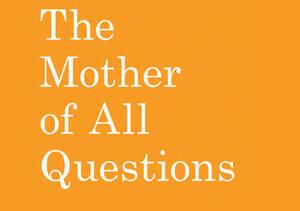The Mother of the Mother of All Questions
I am generally a pessimistic person. I expect the worst to happen; I sometimes despair of my words, my actions, and my choices ever making a difference (this is why, I must confess, I sometimes throw an empty peanut butter jar into the trash, instead of taking the time to wash it out and recycle it). I often don’t believe that the world will ever permanently get better; I constantly expect it to get worse. In the past two years, in many respects, I’ve found myself, unfortunately, vindicated.
This is why reading The Mother of All Questions, an essay collection by the feminist intellectual and author Rebecca Solnit, was such a fraught experience for me. On one hand, as a writer, I was swept away by Solnit’s beautiful, crystal-wrought essays about the search for a good, meaningful, safe life, both for individuals and society. As a feminist, I was moved by reading her reflections on how the rape joke has transformed from something told by men to make fun of rape victims, to something told by women to make fun of rape culture. I was heartened by her chapter on the transformative year 2014, during which rape victims were finally given a voice on social media and in the courtroom. A year in which powerful men like President Obama finally advocated for these victims. I was struck by her invectives against female silence, her exploration of the importance of seeing yourself in art, her declaration that men have arrived to help out with feminism, and her eloquent, searing examinations of how the patriarchy has hurt people of all genders––and how we might transcend it.
But The Mother of all Questions was published in 2017, and it is comprised mostly of essays written between 2014 and 2016. When Solnit wrote these essays, she didn’t know what would happen at the end of 2016, and how much disillusionment the ensuing eighteen months would bring. Donald Trump is only mentioned once in the book, as a presidential candidate. Louis C.K. and Aziz Ansari are mentioned several times, as allies of the feminist movement. In the intervening years, the Trump administration has walked back Obama’s Dear Colleague letter. Louis C.K. has been outed for masturbating in front of women, and Aziz Ansari has been revealed to be just the kind of creep he once denigrated.
Of course, the past eighteen months have also seen incredible victories. There’s a direct line from the #YesAllWomen hashtag of 2014, which Solnit praises at length in her book, to the #MeToo movement that began in late 2017. Still, when I read Solnit’s declaration in her conclusion that we won’t go backwards, no matter how big the backlash, my pessimistic nature kicked in. Not only are we dealing with some pretty enormous backlash post-Trump, and not only do the men in charge once again, emphatically, not care about women and non-binary people at all, but also, #MeToo has unmasked so many so-called male allies. How large a backlash are we going to have to endure? How many times will we have to face disappointment over people who were supposed to be on our side? For a moment, I reflected on Solnit’s erudite prose and mourned for the better time she was writing from, for the strength and hope outlined there. It’s easy to put the book aside and think of all that unfulfilled promise, to wonder whether Solnit’s messages of hope, the power of stories, and change are only myths.
But then I reminded myself that pessimism, and resulting inaction, are a privilege. I’m a woman, which means these social forces shape my life, but I’m also an economically stable white woman, which means I can throw up my hands, despair, and reasonably hope that our regressing society will not touch me. Others do not have this privilege. It is better, then, no matter how outdated and overly hopeful Solnit’s book might feel, to take what we can from it. To remind ourselves that at least, now, we are living in a time when we know the truth about our country, about Aziz and Louis, and can therefore operate from a place of increased knowledge and honesty. To nurture ourselves on Solnit's lessons about empathy, speaking up, and what it means to have a good, meaningful life. Perhaps we need those lessons now, more than ever. Perhaps they will give us the strength to keep telling stories, supporting victims, and recruiting male feminists, even when it might feel hopeless, and to hope, trust, and believe that someday, we can push the pendulum back the other way.
The Mother of All Questions is a JWA Book Club pick; see our discussion questions for the book.







